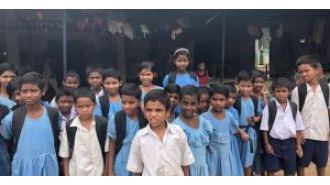Women of color are being consistently let down and facing fatal consequences.
Police often do not respond to domestic violence reports, particularly harming ethnic minority victims.

It seems like every week, we hear about another woman who has lost her life at the hands of a man. This senseless violence is a tragedy that could have been prevented. According to the charity Killed Women, only 4% of family members said their loved one's murder was not preventable at all. This heartbreaking statistic is a reminder that we must do more to protect women from domestic violence.
On November 14, 2024, the news of 24-year-old Harshita Brella's death shook the town of Corby, Northamptonshire. Her body was found in the boot of a car in London. The Northamptonshire Police had been contacted the day before by someone who was concerned for Harshita's welfare. It was also reported that a neighbor had heard a woman's frightened voice and loud noises before she went missing.
Harshita's family described her as a pure-hearted and innocent woman. They shared a heartbreaking tribute, saying that although she is no longer with them, she will always be in their hearts. Her mother and sister remembered her as a kind and loving soul. Before her tragic death, Harshita had sought help from authorities and had a Domestic Violence Protection Order put in place. However, this was not enough to protect her, and her husband Pankaj Lamba is now the main suspect in her murder.
This unfortunate incident highlights the ongoing issue of violence against women, particularly among women of color and migrants. In response, Metro launched the This Is Not Right campaign on November 25, 2024. This year-long campaign aims to bring attention to the alarming rate of violence against women and to work towards finding solutions to this national emergency.
Organizations like Southall Black Sisters and Sistah Space have been advocating for better support and protection for women of color and immigrants who experience domestic abuse. Unfortunately, statistics show that they are less likely to be referred to specialist services and are more likely to be failed by the authorities.
In May 2024, the Metropolitan Police revealed that of the 13 femicide victims recorded in 2023, eight of them were Black, despite only 14% of women in London being Black. This disproportionate number of victims is a cause for concern and emphasizes the need for more support and resources for these communities.
The tragic stories of women like Valerie Forde, Banaz Mahmod, and Nicole Smallman and Bibaa Henry (who were killed by their own family members in so-called "honor" killings) show the extent of the failures within the system. These women had reported their abuse to the police, but their cries for help were not taken seriously.
It is time for a change. We must do better to protect women from domestic violence, regardless of their race, ethnicity, or immigration status. Organizations like IKWRO and the This Is Not Right campaign are working tirelessly to bring attention to this issue and find ways to support and safeguard women who are at risk. We must listen to their stories and take action to prevent more tragedies like Harshita Brella's death.
It seems like every week, we are hit with another tragic news of a woman losing her life at the hands of a man. Sadly, on November 14, 2024, we lost 24-year-old Harshita Brella, who was living in Corby, Northamptonshire, in a horrific incident. Her body was found in the boot of a car in London, and the Northamptonshire Police confirmed that they were contacted the day before her body was discovered when someone raised concerns about her well-being.
According to a neighbour, there was a commotion between a man and a woman before Harshita's disappearance. They could hear shouting and banging, but since the argument was in a different language, they couldn't understand what was being said. It is believed that Harshita was later strangled and her body was taken to London. The police have launched a manhunt for Harshita's husband, Pankaj Lamba, who has been charged with murder by the Crown Prosecution Service.
Harshita's family paid a heart-wrenching tribute to her, saying that she may have left this world, but she will always remain in their hearts. Her mother and sister remember her as a pure-hearted and innocent woman. It breaks their hearts that she had to face such a tragic end. What's even more heartbreaking is that just two months before her death, Harshita had gone to the authorities for help and had a Domestic Violence Protection Order put in place for 28 days. However, it wasn't enough to protect her, and now she is gone.
This is a story we have heard too many times, and it needs to stop. Every death is a tragedy, and most of them could have been prevented. According to the charity Killed Women, only 4% of family members reported that their loved one's killing was not preventable at all. This is why Metro has launched a year-long campaign called "This Is Not Right" in partnership with Women's Aid. Our goal is to bring attention to the alarming rate of violence against women and to make a real change.
The issue of violence against women, especially women of color and migrants, is even more prevalent. Selma Taha, the Executive Director of Southall Black Sisters, points out that in their day-to-day work, they often see Black, minoritized, and migrant victims of domestic abuse being dismissed by statutory agencies. Factors such as institutional racism, the hostile environment for migrants, and cuts to public services make it challenging for these women to access support.
In May 2024, PA obtained figures from the Metropolitan Police, which revealed that out of the 13 femicide victims recorded by the force in 2023, eight of them were Black, despite only 14% of women in London being Black. This disproportionate number of women of color being killed in the UK has been a longstanding issue, but there is a lack of data on women of color and immigrants as domestic abuse victims.
Refuge, the largest specialist domestic abuse organization, found that Black women are less likely to be referred to specialist services by the police compared to white women. Victim Support also reported that ethnic minority victims are disproportionately affected by the police's failure to act on domestic abuse reports.
Valerie Forde and her one-year-old daughter Jahzara's tragic case highlights this issue. In March 2014, Valerie and her daughter were murdered by her ex-partner, even though she had reported his threats to the police six weeks earlier. The police recorded it as a threat to property rather than life, and as a result, they did not receive the necessary support. Since then, organizations like Sistah Space have been campaigning for 'Valerie's Law' to help end domestic abuse in Black communities and provide specialist training for service providers.
The concerns of Sistah Space are echoed by SBS, who state that statutory agencies continue to fail in safeguarding Black, minority, and migrant women. They point to the case of Harshita Brella, who was killed despite having a Domestic Violence Protection Order in place. Banaz Mahmod, who was killed by her father, uncle, and three cousins in an "honour" killing, also reported her domestic abuse to the police multiple times. However, she did not receive the necessary support, and her family continued to pose a threat to her life.
Payzee Mahmod, Banaz's sister and a campaigner for IKWRO, an organization that supports Middle Eastern, North African, and Afghan women and girls at risk of "honour" based abuse, shares her own experience of being failed by the system. She explains how their background as Kurdish migrants and asylum seekers made them invisible to social services, health professionals, and the education system. They did not know how to support girls like her and her sisters, and as a result, they were left vulnerable and in danger.
It is time for society to take action and put an end to this national emergency. We cannot keep losing women to violence, especially those from marginalized communities. Metro's campaign, 'This Is Not Right,' aims to do just that, and we urge everyone to join us in making a change. We must listen to the voices of these women and take action to ensure that no one else has to suffer the same fate as Harshita, Valerie, Banaz, and countless others.
1 Views










